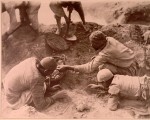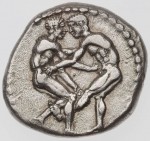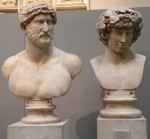 The vast collection of papyrus fragments unearthed at the ancient site of Oxyrhynchus, Egypt, the late 19th, early 20th century continues to bear sweet fruit. King’s College London Classics professor Dominic Rathbone has translated one of the Oxyrhynchus texts and found it’s the only ancient match-fixing contract ever discovered. Written in 267 A.D. in the ancient city of Antinopolis, about 55 miles south of Oxyrhynchus following the west bank of the Nile, the contract stipulates the outcome of the final match of the boys’ wrestling division of the 138th Great Antinoeia games.
The vast collection of papyrus fragments unearthed at the ancient site of Oxyrhynchus, Egypt, the late 19th, early 20th century continues to bear sweet fruit. King’s College London Classics professor Dominic Rathbone has translated one of the Oxyrhynchus texts and found it’s the only ancient match-fixing contract ever discovered. Written in 267 A.D. in the ancient city of Antinopolis, about 55 miles south of Oxyrhynchus following the west bank of the Nile, the contract stipulates the outcome of the final match of the boys’ wrestling division of the 138th Great Antinoeia games.
The boys’ division was for teenagers, so the contract is between the father of finalist Nicantinous and the trainers of the other finalist, Demetrius.
The contract stipulates that Demetrius “when competing in the competition for the boy [wrestlers], to fall three times and yield,” and in return would receive “three thousand eight hundred drachmas of silver of old coinage” [….]
The contract includes a clause that Demetrius is still to be paid if the judges realize the match is fixed and refuse to reward Nicantinous the win. If “the crown is reserved as sacred, (we) are not to institute proceedings against him about these things,” the contract reads. It also says that if Demetrius reneges on the deal, and wins the match anyway, then “you are of necessity to pay as penalty to my [same] son on account of wrongdoing three talents of silver of old coinage without any delay or inventive argument.”
It’s not clear what proceedings they could actually initiate given that match-fixing wasn’t exactly legal, so if they were busted and Nicantinous’ father refused to pay Demetrius’ people the agreed-upon sum, they would hardly be in a position to challenge the reneging through any kind of official channels. Nor does the penalty against Demetrius have much in the way of teeth. Even if Demetrius didn’t take the dive he had agreed to take, it’s not like Nicantinous’ father could take him to court to enforce the three-talent penalty. In fact, given that it’s in an extra-legal penumbra, why bother to have a written contract to fix a fight at all?
 It’s no mystery why fixing the match was advantageous to both sides. Only the winners of ancient game events would win a purse. There was no prize for second place. If the parties are evenly matched and neither of them confident of a positive outcome, why not ensure you at least get something out of being thrown to the ground three times? In this case, unless Demetrius came from a wealthy family, he was likely in debt to his trainers who had housed, fed and coached him in the lead-up to the games. By taking a bribe from Nicantinous’ father, they ensured they wouldn’t be out of pocket no matter what the outcome.
It’s no mystery why fixing the match was advantageous to both sides. Only the winners of ancient game events would win a purse. There was no prize for second place. If the parties are evenly matched and neither of them confident of a positive outcome, why not ensure you at least get something out of being thrown to the ground three times? In this case, unless Demetrius came from a wealthy family, he was likely in debt to his trainers who had housed, fed and coached him in the lead-up to the games. By taking a bribe from Nicantinous’ father, they ensured they wouldn’t be out of pocket no matter what the outcome.
Dad struck a hard bargain, though. The 3,800 drachma Demetrius would receive for throwing the match was small potatoes, just about enough to purchase a donkey. On the other hand, the three talents of silver he would owe Nicantinous if he broke the contract and won was a huge sum. It may have been the amount of an expected bonus, or the amount of a bonus plus an additional penalty.
Although this is the only known contract recording a bribe between ancient athletes, there are references in ancient sources indicating that bribery in athletic competitions was not unusual. By the time of the Roman Empire, bribery in athletic competitions was getting more prevalent as the events became more lucrative, Rathbone said.
“There are sources [indicating] that things had got a bit worse in the Roman Empire when there were more games and when there were more financial rewards, particularly these municipal pensions,” Rathbone said. These pensions consisted of payments that an athlete’s hometown awarded to winners and could continue for the rest of their life.
 The Great Antinoeia games were part of a religious festival held yearly in Antinopolis dedicated to the deified Antinous. Antinous was the favorite (read: lover) of the Roman emperor Hadrian. He accompanied Hadrian on his many travels all over the empire and they were in Egypt in October of 130 A.D. when Antinous drowned in the Nile. It may have been an accident, but several ancient sources believe it was deliberate, that Antinous was sacrificed or sacrificed himself to gain the favor of the gods for Hadrian.
The Great Antinoeia games were part of a religious festival held yearly in Antinopolis dedicated to the deified Antinous. Antinous was the favorite (read: lover) of the Roman emperor Hadrian. He accompanied Hadrian on his many travels all over the empire and they were in Egypt in October of 130 A.D. when Antinous drowned in the Nile. It may have been an accident, but several ancient sources believe it was deliberate, that Antinous was sacrificed or sacrificed himself to gain the favor of the gods for Hadrian.
Hadrian was grief-stricken at the loss. He had his favorite deified, something that had been the exclusive privilege of imperial family members, had medals and coins struck bearing his face (another privilege previously reserved for the imperial family), built temples to the deified Antinous and founded cities named after him. Antinopolis was built on the banks of the Nile at the place where Antinous had drowned. The cult was still going strong nearly 140 years after Antinous death and the games were part of that.
 There is no record of who won what events at which games, so there’s no telling what the outcome of this backroom deal was. At some point, the contract was thrown in the garbage where it would be recovered by pioneering papyrologists Bernard Pyne Grenfell and Arthur Surridge Hunt who first started looking through Oxyrhynchus’ trash heaps in 1896. The light covering of sand and complete lack of rainfall created a perfect storm of papyrus preservation. Over the years of excavations at Oxyrhynchus, more than 500,000 papyrus fragments were unearthed, most of which are now at the Sackler Library at Oxford.
There is no record of who won what events at which games, so there’s no telling what the outcome of this backroom deal was. At some point, the contract was thrown in the garbage where it would be recovered by pioneering papyrologists Bernard Pyne Grenfell and Arthur Surridge Hunt who first started looking through Oxyrhynchus’ trash heaps in 1896. The light covering of sand and complete lack of rainfall created a perfect storm of papyrus preservation. Over the years of excavations at Oxyrhynchus, more than 500,000 papyrus fragments were unearthed, most of which are now at the Sackler Library at Oxford.
Only a small percentage of the fragments have been translated in all this time, simply because there is such a wealth of material to go through. Discoveries range from the most rarified sole surviving copies of ancient literature to the most fascinatingly mundane sales receipts, personal letters, shopping lists and tax returns. And now, a match-fixing contract.